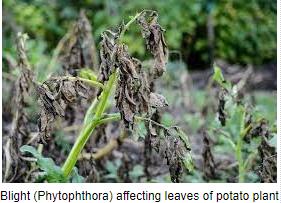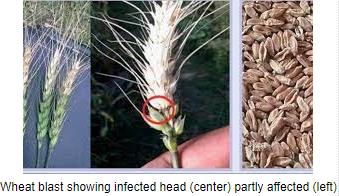
Caitlyn Talbot, writing in the November 18th edition of The Economist, highlights concern over plant diseases. Wheat blast, a fungal infection that originated in Brazil, has spread worldwide with outbreaks in Zambia in Africa and Bangladesh in Asia. Wheat blast fungus also impacts rice and if it extends to India, could result in decreased harvests with reduced availability for domestic consumption and exports. Blackleg, a bacterial disease of potatoes, Virus Y and Blight are responsible for extensive losses in the crop.
To achieve efficiency, many nations have adopted monoculture making extensive areas of a specific crop susceptible to damage following introduction of a new plant pathogen. Global  warming may increase the virulence of bacteria and the range of insect-transmitted plant pathogens has increased over the past three decades. Despite inspection of consignments of agricultural commodities, the spread of pathogens is difficult to control as occurred with coffee rust emerging in Hawaii.
warming may increase the virulence of bacteria and the range of insect-transmitted plant pathogens has increased over the past three decades. Despite inspection of consignments of agricultural commodities, the spread of pathogens is difficult to control as occurred with coffee rust emerging in Hawaii.
The use of plant protection chemicals is declining in efficiency and scientists are raising concerns over environmental pollution.  Breeding of genetically resistant strains of crops by either conventional selection or genetic modification offers a partial solution but ultimately, pathogens are capable of evading resistance. The prospect of famine in non-industrialized and overpopulated nations as a result of existing and emerging plant pathogens represents an ever-present reality.
Breeding of genetically resistant strains of crops by either conventional selection or genetic modification offers a partial solution but ultimately, pathogens are capable of evading resistance. The prospect of famine in non-industrialized and overpopulated nations as a result of existing and emerging plant pathogens represents an ever-present reality.
Poultry farmers are not alone in confronting Mother Nature.